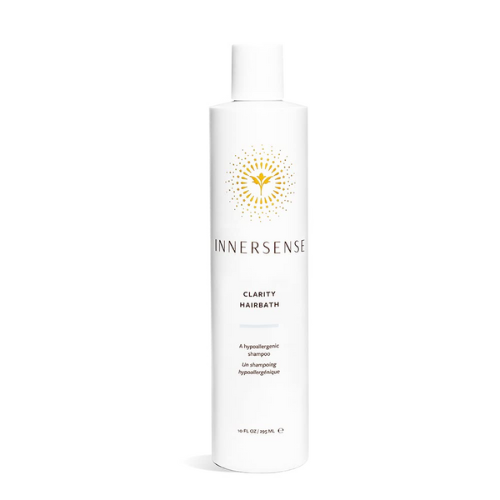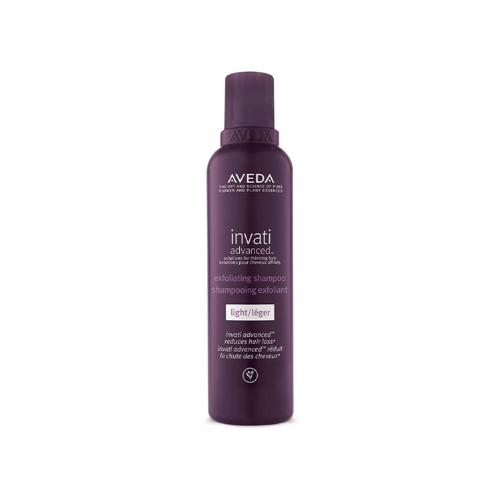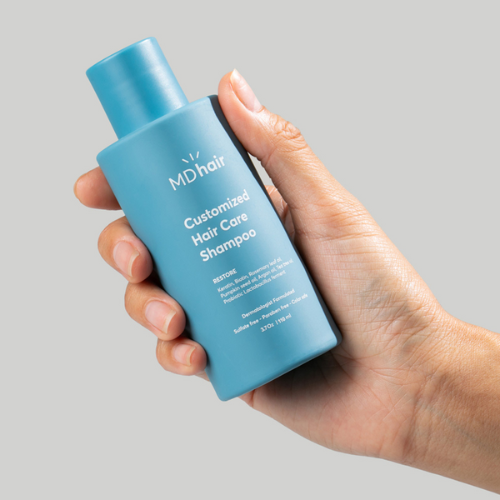The Best Regrowth Shampoos for Hair Loss and Thinning, According to Trichologists

Our editors independently select the products we recommend. We may earn a commission on items bought through our links.
The world of remedying, preventing, and restoring hair loss is filled with gimmicks, and “hair growth shampoo” certainly sounds like one. Can a shampoo help actively regrow hair like hair loss and hair restoration remedies can? Hair growth shampoos target men who have experienced male-pattern baldness (androgenetic alopecia) and include ingredients that promise to help boost circulation to the follicles, fight the hormonal byproduct that shrinks hair follicles, make hair grow thicker or faster as well as a few other “benefits.” The question of whether they work or not is one of expectation setting.
Today's Top Deals
Don’t put too much pressure on shampoo, says Kerry E. Yates, trichologist and founder of Dallas-based beauty agency Colour Collective. “The act of a shampoo is to cleanse not deposit.” In other words: Any active ingredients in shampoo won’t have the opportunity to absorb into the skin like a serum, topical medicine, scalp mask or similar product. For this reason, Yates isn’t a fan of shampoos that make any such promise to “eradicate hair loss and restore new growth.”
But still, it’s important to choose a shampoo that supports one’s hair regrowth efforts. That’s where the ROI comes in: Maybe a shampoo can’t fight DHT, the testosterone byproduct that causes hair loss, whose actual name is dihydrotestosterone. But, there are shampoos that help volumize thinning hair, or that won’t dehydrate the hairs or scalp as they cleanse, which sets a great foundation for other methods of stimulating hair regrowth. Read on for more insight on choosing the best shampoo for hair loss, with expertise from Yates and Gregorio Ruggeri, a stylist and trichologist as well as owner of Salon Ruggeri in NYC.
What the Experts Say
“You need topical products [like serums or minoxidil] as well as ingestible remedies in order to fight hair loss,” says Ruggeri, echoing Yates’ perspective. But with that said, there are still active ingredients in many shampoos that support hair growth by balancing the scalp, reducing inflammation, taming oil levels, and so forth. These ingredients work more actively at the surface of the skin than those that target the hair follicles.
Here are the ingredients that Yates suggests seeking in a shampoo for thinning hair—not necessarily all at once, but in general. Again, they won’t suddenly induce growth within the hair follicles, but they will support better growth by balancing the scalp. “After all, in order to ensure you have a healthy head of hair, you need to ‘clean the landscape and fertilize’,” says Ruggeri.
Aloe Vera — Yates calls this ingredient “nature’s healer,” since it helps to calm the skin. “Aloe instantly hydrates and can offer support for dermatitis,” she says. And remember: Dandruff is often the result of seborrheic dermatitis, so aloe can help on that front.
Tea Tree Oil — This essential oil is a common ingredient in scalp remedies thanks to its antifungal, antibacterial, and anti-inflammatory properties, and it can even balance oil levels. This makes it perfect in dandruff shampoos, as well as those targeting dry scalp and oily scalps alike.
Peppermint Oil — “Here’s another essential oil that helps reduce itchiness and also invigorates the scalp,” Yates says.
Witch Hazel — This natural astringent is commonly found in facial toners for its soothing properties. “Witch hazel helps reduce irritation, supports proper follicle health, plus helps alleviate product build-up and excess sebum,” explains Yates.
Salicylic Acid — This exfoliating ingredient helps release dead skin cells from the scalp as well as those trapped inside the pores, plus it helps balance oil production and flushes out excess sebum in the pores, too. Like tea tree oil, it is also a popular natural remedy for dandruff.
As for ingredients that are somewhat mistaken as “good in hair loss shampoos”, Yates calls out biotin. “Sometimes hair loss is attributed to a biotin deficiency,” she explains. “There are various products on the market that tout the inclusion of biotin to alleviate hair challenges. But honestly, the benefits are realized when biotin is ingested, and not when it is topically applied.”
What’s the ROI?
No shampoo should break the bank, and since there is no real thing as a “shampoo for hair growth”, don’t throw any money at the ones promising panacea-like results. The ROI for those is zilch, Yates says. Instead, choose shampoos with the above active ingredients, spending anywhere from $15-50 on a one-month or three-month supply.
Ruggeri says to pair this shampoo with other proactive products that can soak into the follicles (like serums, minoxidil, or topical finasteride), as well as ingestible remedies (minoxidil, finasteride, and nutrient-dense hair supplements).
“Find the products that resonate with you and, if after three months the results are not what you thought, try another product,” he says. “Three months is the required time to see if the product is doing what it states.” And, in order to maintain results, the product needs to be used perpetually.
The Best Hair Growth Shampoos, According to Trichologists and Hair Loss Experts

BEST OVERALL
Paul Mitchell Tea Tree Shampoo Collection
BUY NOW - for thinning hair
buy NOW - FOR fine hair
buy NOW - FOR oily hair
buy NOW - for thick and/or dry hair
Yates shouts out this entire “Tea Tree” line of shampoos from Paul Mitchell, which uses tea tree oil as the hero ingredient. “These work well in cleansing the scalp and hair, supporting proper scalp health, and helping alleviate the negative effects of dandruff,” she says.
Shop based on hair variables, thinning hair is just one example of many different needs one may have. This line includes options for oily scalps, dry scalps, coarse hair, and naturally fine hair. That’s why this whole assortment wins the top spot. Choosing a shampoo based on hair type removes some of the pressure regarding restoring hair growth, and sets the scene for conditioners, serums, and ingestible products to perform better.

BEST CLARIFYING
Innersense Clarity Hair Bath Shampoo
Buy Now On Amazon
Buy Now from credo beauty
Buy Now from innersense
Key Ingredients: This one is intentionally free of essential oils in an effort to remain gentle. It uses chufa milk which is rich in amino acids to moisturize the scalp and strands, as well as comfrey leaf and Senburi, a Japanese herb, to reduce or prevent inflammation.
Why It’s Great: A clarifying shampoo is one that deeply cleanses the scalp—except many of them also over-cleanse as a result, so look for gentle recipes. “This clarifying formula is designed with sensitivities and allergies in mind,” says Yates. “The super clean formula is perfect for everyday use since it gently cleanses without stripping the hair or scalp of its natural sebum.”

BEST VOLUMIZING
Aveda Invati Advanced Exfoliating Shampoo Light
Buy Now at nordstrom
Buy Now from aveda
Key Ingredients: “Aveda’s Invati Advanced line is designed to support users with thinning hair challenges since it is infused with a high level of natural ingredients,” notes Yates. Specifically, anti-inflammatory turmeric combines with antimicrobial ginseng, oil-balancing and exfoliating salicylic acid, plus nourishing glycerin and stimulating caffeine.
Why It’s Great: Designed for fine hair, this “light” formula cleanses without any hefty ingredients, and promotes better volume and general density upon rinsing clean.

BEST INGREDIENT ROSTER
MDHair Restore Shampoo
Buy Now
Key Ingredients: While this one does include DHT-fighting ingredients, just consider those a superfluous bonus, since its roster also includes scalp-harmonizing probiotic lactobacillus ferment as well as tea tree oil (plus keratin for hair strength).
Why It’s Great: Here’s a brand whose profile is on the rise, thanks to the experts behind the formulas. “MDHair also has a team of trichologists and dermatologists personally responding to client’s needs,” says Ruggeri.
Frequently Asked Questions About Hair Growth and Thinning Hair
Does biotin shampoo help regrow hair?
No. While biotin has hair-fortifying benefits, it should be ingested in order to help hair grow thicker, says Yates. Certain scalp treatments (like serums or masks) might include biotin, but the most beneficial way to take biotin is to ingest it as a supplement. As for biotin shampoo specifically, it doesn’t sit on the scalp long enough to be absorbed into the follicles, so any promise to regrow hair is a false claim.
How often should you wash thinning hair?
“For proper scalp health you need to wash your hair more than once a week,” says Yates. Typically every second or third day is ideal, although people with thin hair may want to wash more frequently since a buildup of oil and product residue can really weigh down on fine strands.
And don’t mistake “thin hair” with “thinning hair”; the former refers to people with fine strands, and the latter refers to people who are actively losing hair. Scrubbing away at the scalp won’t cause more hair shedding for those in the “thinning” camp, and in fact, a scalp massage whilst shampooing can stimulate circulation and improve follicle health. “Gently massage the scalp when applying shampoo as opposed to using aggressive scrubbing brushes,” Yates adds.
Can shampoo prevent hair loss?
No, there isn’t a single shampoo that will slow or reverse hair loss. Any product that will impact follicle health needs to be ingested or absorbed into the scalp, and shampoo never has enough time to do this, since its primary function is to cleanse. “One product can’t do everything,” Ruggeri explains. “Shampoo cleanses and stimulates the scalp, but then we need to close and seal the cuticle with conditioner.”
About the Author
Adam Hurly has been covering the grooming industry for a decade after getting his start at Birchbox in 2013. Since becoming a freelance journalist in 2016, he has written for nearly every men’s title. In addition to SPY, his frequent clients include GQ, Men’s Journal, Robb Report, Forbes, and more. Hurly is a South Dakota native, a University of Kansas graduate, a New Yorker at heart, and has resided in Berlin for 5 years.
More Top Deals from SPY
Best of SPY
